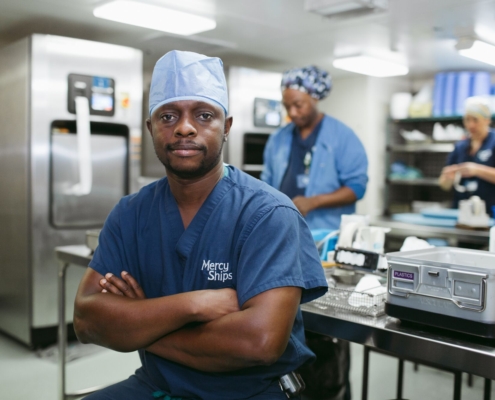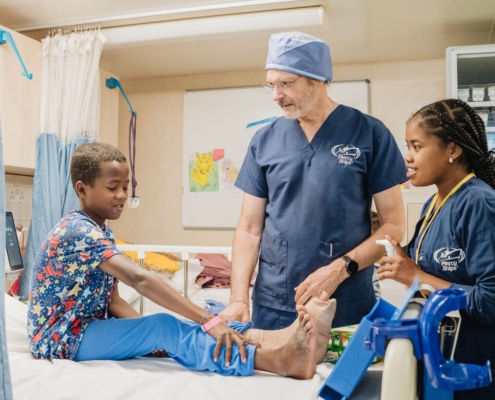Sierra Leonean Physiotherapists Board the Global Mercy™ for Skills Enhancement
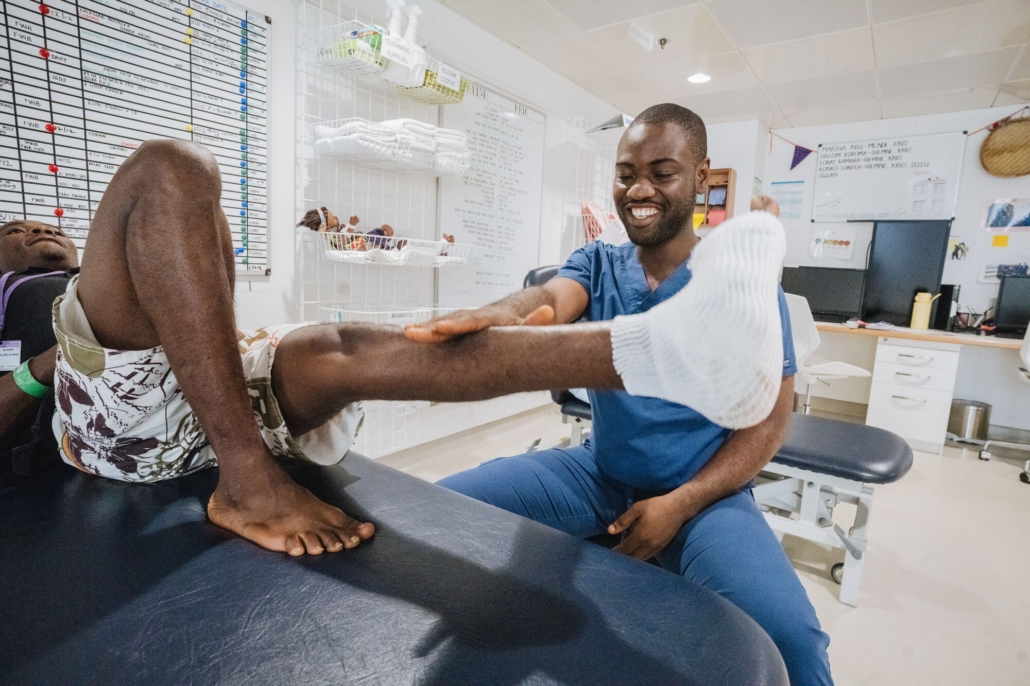
Samuel Mayah, ETA participant, with a patient during rehab.
Through its Education, Training, and Advocacy (ETA) programs, Mercy Ships is helping build skills among emerging and trained professionals committed to enhancing surgical care in Sierra Leone.
In a landmark moment for Sierra Leone’s healthcare system, the country’s first-ever cohort of physiotherapy graduates earned their Bachelor of Science (B.S) degrees in 2023. This achievement marked a significant step in addressing the critical shortage of rehabilitation professionals.
Sierra Leone hasn’t had an extensive physiotherapy workforce for many years, and to address that gap, a degree program was started a few years ago at the Tonkolili District College of Health Sciences in Masanga, Sierra Leone.
Through a partnership with the Ministry of Health and Mercy Ships, new graduates and senior physiotherapists came aboard the Global Mercy™ to shadow, collaborate, and work with the hospital ship’s rehabilitation team.
Physiotherapists Abu Amara and Samuel Mayah from Freetown arrived at the Global Mercy to expand their experience and rehabilitation skills by joining the on-ship team. Aboard the Global Mercy, they learned everything from managing and scheduling patients in a rehabilitation department to the more technical rehabilitation techniques for patients recovering from surgeries on their hands, arms, or legs.
“For me, I believe in the physiotherapy profession, no matter what the situation of the person, even if your forelimbs are absent, as long as you have the breath of life, we can make you as useful as possible,” Abu said.
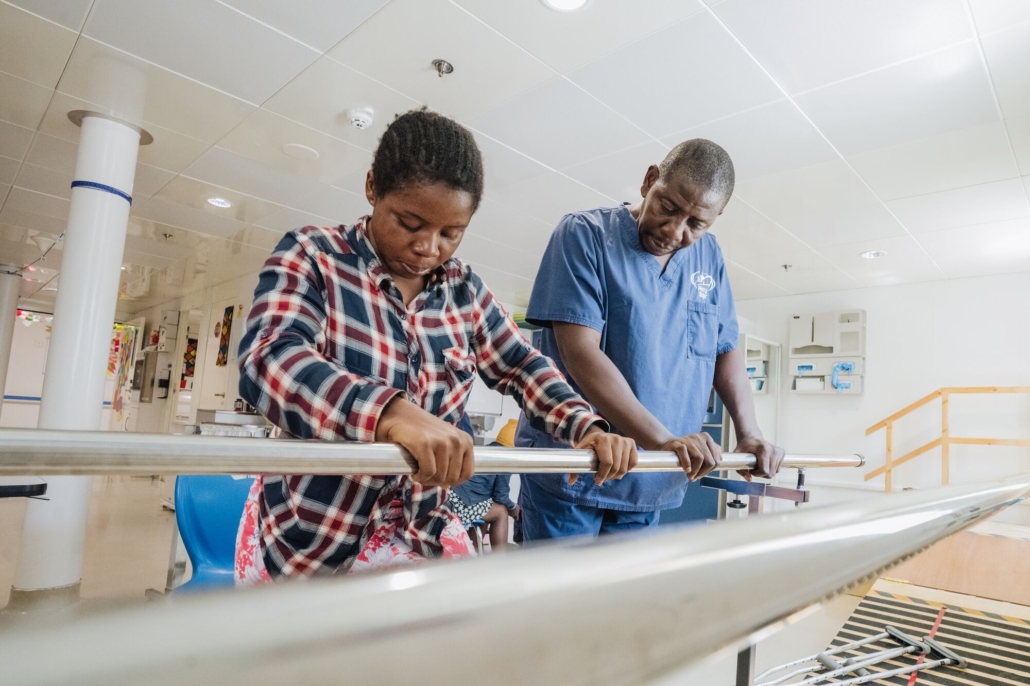
Abu Amara, ETA participant, with a patient during rehab.
The history of physiotherapy in Sierra Leone is rooted in the country’s post-independence healthcare development and, like other forms of healthcare, has been shaped by historical, social, and political challenges.
Physiotherapy services emerged in the mid-20th century. It was initially introduced by foreign medical teams and missionaries to address rehabilitation needs, particularly for individuals affected by polio, trauma, and other physical disabilities.
In the 1990s, the country’s civil war significantly increased the demand for physiotherapy due to the high number of amputees, trauma victims, and individuals with war-related injuries. International humanitarian organizations were critical during this period, providing emergency rehabilitation services and training local healthcare workers.
Local physiotherapy training programs have been established gradually, but the country still faces a shortage of trained physiotherapists. Initiatives by government bodies, NGOs, and international partnerships aim to address this gap.
In Sierra Leone specifically, integrating rehabilitation services into surgical care can address the rising burden of non-communicable diseases, trauma, and post-conflict health needs, fostering a healthier, more resilient population.
The country’s only tertiary-level physiotherapy education program through the Tonkolili District College of Health Sciences has been pivotal in training local professionals. Mercy Ships’ ability to host these graduates and more experienced physiotherapists only enhances the opportunities for these healthcare workers to continue to grow and sustain their physiotherapy skills in the country.
As he assisted a patient with her range of movement, Abu reaffirmed this critical partnership in his profession.
“The level of service that Mercy Ships is rendering is of a high standard, and I feel like it’s an opportunity for me to be exposed to this level of service,” he said. “There are things we are learning that we can certainly adopt.”
While on board the Global Mercy the physiotherapists treated a range of patients, addressing diverse rehabilitation challenges and worked closely between departments, observing scheduling, patient flow, and general rehab department management.
“The senior physiotherapists have been more interested in how the rehab clinic is set up, how it functions and how it is managed, whereas the junior ones focus more on the technical physiotherapy skills,” said Suzanne Thomas, Director of ETA for Sierra Leone at Mercy Ships.
Samuel Mayah agreed, highlighting his commitment to patient-centered rehabilitation care.
“People follow procedures. A patient should become the center of our focus. We should be able to assess our patients, touch their lives, and make meaningful changes in their lives after an intervention,” he said.
“Having Mr. Abu and Samuel join us in rehab has been great. Their enthusiasm for learning, sharing their knowledge and context of conditions they treat has helped our understanding of the population we serve but has enabled them to take away things that they have learned and can try implement within their service,” said Becky Chaplin, Rehab Team Leader on the Global Mercy. “It’s a great opportunity to collaborate with the in-country physiotherapists in Sierra Leone.”
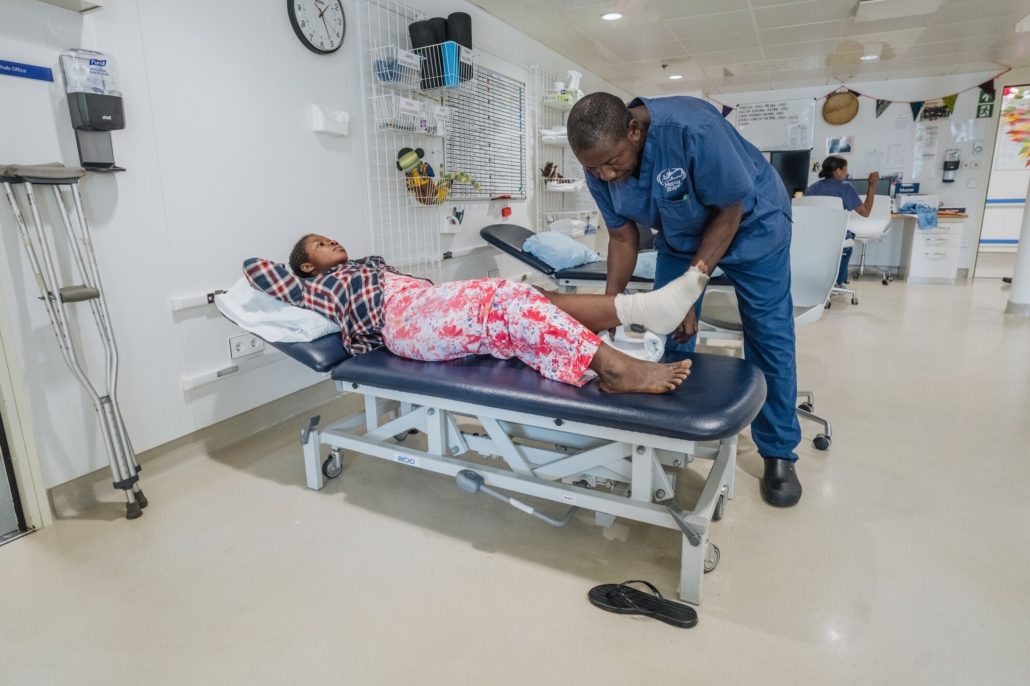
Abu, working with his patient.
Medical rehabilitation is crucial in countries like Sierra Leone, where healthcare infrastructure is developing, as it helps restore functionality, independence, and quality of life for patients recovering from injuries, illnesses, or disabilities.
The collaboration between local physiotherapists and the team on the Global Mercy is a shared effort. It reduces the long-term burden on families and communities by enabling patients to regain mobility and perform daily tasks, contributing to productivity and social inclusion.
By striving to grow a rehabilitation base in-country, these professional services help minimize the economic strain on the current healthcare system by preventing complications and hospital readmissions.
Safe surgery is just the beginning. Through its ETA programs, Mercy Ships is equipping local healthcare professionals with the knowledge and skills to strengthen rehabilitation services in Sierra Leone and beyond. By collaborating with the Rehab Team aboard the Global Mercy, physiotherapists like Abu and Samuel are gaining hands-on experience that will directly help improve patient care in their communities.
Learn more about how the Mercy Ships ETA programs build medical capacity and transform healthcare at mercyships.org.

